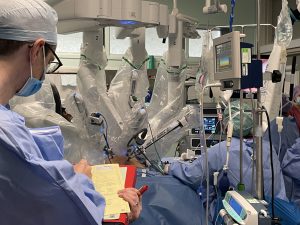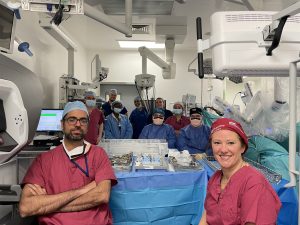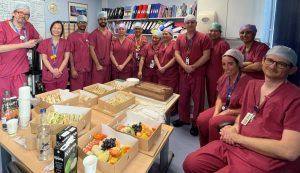Robotic Assisted Surgery
New technology to support patients receiving surgery is developing all the time, and at Bedfordshire Hospitals we’re using the very latest equipment to make surgery as straightforward and comfortable as possible for patients.
In 2023, the Trust invested almost £4m into two da Vinci Xi robots, supplied by Intuitive Surgical – one at Bedford Hospital and one at Luton & Dunstable University Hospital. They are being used across a range of different specialties, treating patients with conditions ranging from bowel and bladder cancer to endometriosis, and complex head and neck conditions.
Robotic assisted surgery carries many benefits for patients – it is less invasive, leads to less pain post-operatively, and can lead to a faster recovery time.
Our surgeons and their teams are trained to use the robots across a range of different specialties – General Surgery (which includes colorectal (e.g. bowel), upper GI (gastro intestinal) and bariatrics – Gynaecology, Urology, ENG (Ear, Nose & Throat) and OMFS (Oral and Maxillofacial). Our Bariatric (Obesity) team sees patients from all over the East of England, and will also be using the new technology.
How does robotic assisted surgery work?

The robots have four mechanical arms, with a surgical instrument attached to each arm. They are controlled by a surgeon seated at a computer console near the operating table, and supported by the operating department team.
The console gives the surgeon a magnified high-definition, 3D view of the area, so they can perform complex procedures with more precision, flexibility and control than using conventional techniques.
The tiny wristed instruments move like a human hand, but with a wider range of motion, allowing surgeons to perform a variety of different procedures with a few small incisions.
Other members of the surgical team will position themselves around the patient and the robot, and view the operation on monitors.
When did the Trust introduce this new technology?
After a great deal of training and planning by the whole team, the first robotic assisted surgical procedure was carried out at Bedford Hospital on 17 April by colorectal surgeon Mrs Katharine Bevan, followed on 2 May by the first procedure at the L&D – this was done by surgeon Mr Firas Younis. Both procedures went smoothly and the patients recovered well – a cause for celebration by both teams. By 15 May, a further 17 operations had been completed using the new robot technology.




